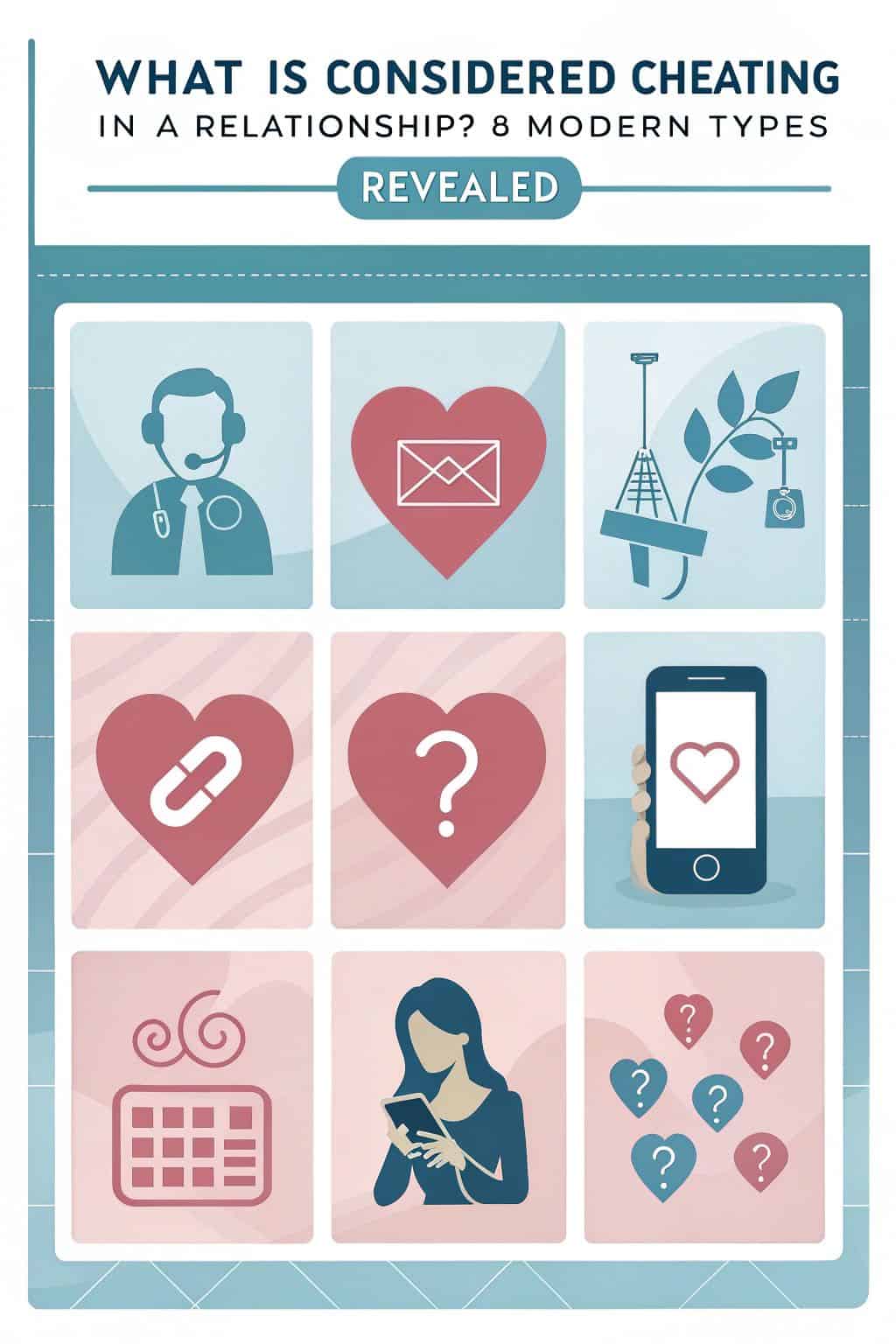Defining what counts as cheating in a relationship creates confusion for many couples today. Studies show that 70% of Americans can’t agree on which actions count as cheating. This guide breaks down eight modern types of unfaithful behavior, from emotional affairs to virtual cheating.
We’ll help you spot the warning signs and set clear boundaries with your partner.
Key Takeaways
Studies show 26-75% of people cheat based on different views of what counts as cheating. A 2023 study found cheating hurts relationships more than anything else across 160 cultures.
Eight main types of cheating exist today: physical, emotional, online/virtual, micro-cheating, fantasy-based, flirting, secret texting, and hidden emotional bonds. Physical and emotional affairs often cause the deepest relationship damage.
Common signs of cheating include sudden behavior changes, increased phone privacy, working late often, emotional distance, and less physical intimacy. Trust your gut when you notice these changes.
Most couples need clear boundaries about what counts as cheating. This includes rules about social media use, close friendships, and porn viewing. Regular talks about these limits help prevent cheating.
Professional help from couples therapists like Moshe Ratson and Raffi Bilek can guide healing after cheating. Therapy gives partners tools to rebuild trust and improve communication.
Table of Contents
Defining Cheating in a Relationship

Cheating means different things to different people. Most folks agree that cheating breaks trust and loyalty in a relationship. Studies show 26% to 75% of partners cheat, based on what each person calls cheating.
Breaking relationship rules counts as cheating in both open and closed relationships. For example, having sex with others without your partner’s okay is cheating in most cases. But watching camgirl videos isn’t usually seen as cheating by most couples.
Trust is like a paper – once crumpled, it can never be perfect again.
Physical acts aren’t the only form of betrayal. Emotional bonds, secret texting, or hidden social media chats can cross lines too. A 2023 study found cheating ruins relationships more than anything else across 160 different cultures.

Clear boundaries help avoid confusion about what counts as cheating. Your partner’s idea of cheating might differ from yours, so talking openly about limits matters most.
Types of Cheating

Cheating takes many shapes in modern relationships. Physical affairs grab the spotlight, but emotional bonds and online flirting can hurt just as much.
Physical Infidelity

Physical infidelity breaks trust in the most direct way possible. Your partner crosses clear physical boundaries by engaging in intimate acts with someone else. These acts range from kissing and touching to full sexual intercourse.
Most men view this type of betrayal as a clear deal-breaker in their relationships. The pain cuts deep because physical intimacy creates a special bond between partners.
Many guys struggle with images of their partner being physically close to another person. The betrayal hits harder because physical cheating involves conscious choices. Your partner must decide to meet up, get close, and cross those physical lines.
The act itself requires planning and active participation. Physical cheating often leads to emotional distance between partners too. Trust gets shattered, and rebuilding that connection takes serious work through open communication or professional help like couples therapy.
Emotional Cheating

Emotional cheating strikes deep at the heart of relationships. A partner might share their deepest feelings, dreams, and secrets with someone else while keeping you in the dark. They build strong bonds through late-night texts, private chats, and deep conversations that should belong in your relationship.
This type of betrayal often hurts more than physical affairs because it creates distance between partners who once shared everything.
Many guys miss the signs of emotional affairs until it’s too late. Your partner might guard their phone closely or spend hours chatting with a “friend” from work. They stop sharing their daily thoughts with you and become defensive when you ask about their new connection.
The emotional bond they form outside your relationship can damage trust just as much as physical cheating. Setting clear boundaries about emotional intimacy helps protect your relationship from this silent threat.
Online or Virtual Cheating

Online cheating happens through screens and digital devices. Your partner might send flirty texts, share intimate photos, or build secret bonds with others on social media or dating apps.
Many guys don’t see watching adult videos as cheating, but sending private messages or having cyber-sex crosses the line in most relationships. The rise of smartphones has made virtual affairs easier to start and harder to spot.
Digital infidelity leaves traces in pixels, not lipstick marks.
Secret online relationships can damage trust just like physical affairs. Your partner might hide their phone, change passwords often, or get defensive about their social media use.
These virtual connections often lead to emotional bonds that hurt real-life relationships. Dating apps like Tinder make it simple to find new romantic connections, even if nothing physical happens in person.
Micro-Cheating

Micro-cheating sits in a gray area of relationship boundaries. These small acts might seem harmless at first glance but can damage trust over time. Saving an ex’s number under a fake name, hiding messages from your partner, or maintaining active dating profiles count as micro-cheating.
Many guys brush off these behaviors as innocent fun, yet they create tiny cracks in relationship trust.
Secret emotional bonds and hidden digital connections make up most micro-cheating cases. I’ve seen countless relationships suffer from seemingly minor actions like excessive social media likes or private DMs to attractive coworkers.
These small trust breaches stack up fast. Your partner spots a flirty comment here, notices a hidden chat there, and soon the relationship feels shaky. Clear boundaries and honest talks about what counts as micro-cheating help prevent bigger problems down the road.
Fantasizing or Sustaining Romantic Feelings

Romantic thoughts about someone else can damage your current relationship. Many men struggle with persistent fantasies about other people while in committed relationships. These thoughts create a deep emotional gap between partners.
The brain releases feel-good chemicals during fantasies, making them addictive and hard to stop. Your emotional support for your partner drops as you feed these outside romantic feelings.
Strong sexual or romantic daydreams pull your mind away from your girlfriend or spouse. The mental health impact shows up fast – you start feeling guilty and distant. Your partner notices the emotional walls going up.
This pattern breaks trust and leads to relationship conflict. Healthy relationships need full emotional presence from both people. Getting lost in fantasies about others blocks real intimacy with your partner.
Gray Areas of Cheating

The line between friendly chats and emotional affairs gets blurry in modern relationships. Some actions might not count as direct cheating but can still harm your bond with your partner, like hiding text messages or forming deep connections with others behind their back.
Flirting in a Monogamous Relationship
Flirting outside your relationship crosses a line that many couples struggle to define. Most people see casual flirting as harmless fun, but it can damage trust in monogamous relationships.
Partners often disagree about what counts as innocent behavior versus actual cheating. Some view playful banter with others as a betrayal of trust, while others feel comfortable with light social interactions.
Setting clear boundaries about flirting helps avoid hurt feelings and broken trust. Many couples choose to discuss specific rules about acceptable interactions with others. This might include limits on physical touch, private messaging, or sharing personal details.
Gray areas exist in every relationship, but open talks about comfort levels build stronger bonds between partners. Direct communication prevents misunderstandings that could harm your connection.
Texting or Messaging on Social Media
Texting habits can make or break trust in modern relationships. Secret messages to an ex or flirty DMs with coworkers cross clear relationship lines. Many guys don’t see casual chats as a big deal, but hidden conversations signal deeper issues.
Your partner deserves to know about your online friendships and interactions.
Digital infidelity starts with a simple message and ends with a broken heart.
Social media platforms make it easy to blur friendship boundaries. Private chats, late-night messages, and deleted conversations raise red flags in relationships. Partners should feel comfortable sharing their phones without fear.
Hiding texts or social media activity often leads to emotional cheating and damaged trust. The next section explores how secret emotional bonds form outside primary relationships.
Developing Secret Emotional Bonds
Beyond casual messages, people often build deep emotional ties with others outside their relationships. Secret emotional bonds grow stronger through private chats and shared personal stories.
Partners hide these connections from each other, making excuses for frequent contact with their new friend. The bond feels special because it stays hidden from everyone else.
These secret friendships cross a line into emotional cheating. A person shares their hopes, fears, and dreams with someone else instead of their partner. They spend more time thinking about this new person than their actual relationship.
The rush of excitement from these secret chats creates distance between partners. Trust breaks down as one person pours their emotional energy into someone else. Many relationships suffer damage from these hidden emotional affairs, even without physical contact.
Signs Your Partner May Be Cheating

Spotting changes in your partner’s daily habits, like sudden phone privacy or working late often, can signal trouble in paradise – want to know what other red flags you should watch for?
Changes in Behavior
Your partner’s sudden behavior shifts can signal trouble in your relationship. A common red flag pops up when they start changing their daily habits without clear reasons. I’ve noticed in my counseling practice that cheaters often dress up more than usual or make odd schedule changes.
They might spend extra hours at work or become glued to their phones. These changes link closely to what experts call red flags in dating.
Physical signs often match emotional distance in relationships. Your partner might dodge your hugs or avoid sexual intimacy. They could start hiding their phone screen or step away to take calls.
Money habits might shift too, with strange expenses showing up. Trust your gut if you spot these changes – they often point to deeper relationship issues that need addressing through open talks or professional help.
Increased Secrecy
Sudden secrecy stands out as a major red flag in personal relationships. A partner might start guarding their phone with strange intensity or change all their passwords without explanation.
They go dark for hours, becoming totally unreachable during odd times of the day. These actions often point to hidden sexual relations or romantic bonds forming outside the relationship.
Secret-keeping behaviors show up in many forms during relationship conflicts. A once-open partner may now leave the room to take calls or flip their phone face-down when you’re near.
They might create new email accounts or delete their browsing history regularly. Trust rebuilding becomes harder as these actions pile up. The pattern of hiding things breaks the basic trust needed for healthy boundaries in relationships.
Emotional Distance
Emotional distance hits like a brick wall in relationships. Your partner starts pulling away, showing less warmth, and acting cold toward you. They skip those morning texts, dodge your calls, or give short answers to your questions.
I’ve seen this pattern countless times in my work with couples – the emotional walls go up right before trust falls apart. Your partner might stop sharing their daily experiences or emotionally abusive behaviors start showing up.
Physical signs often match the emotional gap. Your partner’s body language changes – they cross their arms more, avoid eye contact, or move away from your touch. The bedroom changes too, with less cuddling and physical closeness.
They might blame work stress or family issues, but these excuses pop up too often. Trust your gut if you notice these shifts. Your partner’s emotional withdrawal pairs with inconsistent stories about where they’ve been or who they’re texting.
These red flags deserve attention, not denial.
The Impact of Cheating on a Relationship

Cheating hits like a wrecking ball to your relationship, leaving deep scars that affect both mental and emotional health. The betrayed partner often faces anxiety, depression, and low self-worth, while the cheater grapples with guilt and shame that can last for years.
Trust Issues
Trust breaks hit men hard after betrayal. Your brain starts playing tricks on you, making you doubt every text, call, or late night at work. The pain runs deep, affecting your mental health and daily life.
Many guys struggle to sleep, focus at work, or feel confident in their own judgment.
Rebuilding trust takes time and honest work from both partners. Most men need clear proof of changed behavior to start healing. Your partner must show real actions, not just empty promises.
Open phone policies, location sharing, and regular check-ins help create safety. Marriage counseling gives you tools to process anger and rebuild your bond step by step.
Emotional and Mental Health Effects
Beyond broken trust, cheating creates deep emotional wounds that can last for years. Many people face post-traumatic stress disorder after discovering their partner’s affair. The betrayal triggers anxiety attacks, depression, and intense mood swings.
Your mind might race with painful thoughts day and night.
The mental toll affects every part of life. Sleep becomes harder. Work performance drops. Some people lose interest in activities they once loved. Many turn to substance abuse to cope with the pain.
A clinical psychologist can help process these complex emotions through individual therapy. Mental health support plays a key role in healing from relationship trauma.
Preventing Cheating in a Relationship

Prevention starts with building a strong foundation of trust through open talks about what counts as cheating in your relationship. Setting clear rules about social media use, friendships with others, and personal space will stop many problems before they start.
Setting Clear Boundaries
Clear boundaries protect your relationship from harm. Talk openly with your partner about what counts as cheating in your romantic relationship. Set firm rules about porn use, social media chats, and close friendships.
Make these talks a regular thing – relationships change over time, and so should your agreements.
Being direct saves you from future heartache. Spell out what makes you feel safe and respected in the relationship. Share your views on flirty texts, work friendships, and online behavior.
A family therapist can guide these talks if needed. Strong boundaries build trust and stop small issues from growing into big problems.
Open Communication with Your Partner
Talking openly with your partner builds a strong foundation for trust. You must share your feelings, needs, and concerns without fear of judgment. A good talk means both partners listen and share equally.
Simple chats about daily stuff can prevent big problems later. Many couples find that setting aside 15 minutes each day for honest talks helps keep their bond strong.
Good talks need the right setting and timing. Pick a quiet place where you both feel safe to speak freely. Speak up about what bothers you before small issues grow into big ones. Use “I feel” statements instead of blame words.
Your partner can’t read your mind, so express your thoughts clearly. This helps solve conflicts and keeps your relationship healthy through open dialogue and mutual respect.
How to Address Cheating in a Relationship

Facing cheating head-on takes guts, but it’s vital for your mental health and the future of your bond. A skilled relationship counselor can guide you through tough talks and help both partners understand the root causes of infidelity.
Acknowledging the Issue
Facing the truth about cheating takes guts. Most guys prefer to brush off signs of relationship trouble or make excuses. Yet, open talks about cheating can fix many relationship problems.
The first step is to admit something isn’t right. Many guys tell me they feel scared to bring up their concerns. But speaking up shows strength, not weakness.
Direct communication beats hiding from hard facts. Your partner needs to know how their actions affect you. Bring up specific examples without attacking them. Stay calm and listen to their side too.
This opens the door to real solutions through relationship counseling or honest talks. Getting professional help might feel tough, but it beats losing someone you care about. Let’s look at how couples therapy can help rebuild trust….
Seeking Couples Therapy or Counseling
After facing the truth about cheating, many couples turn to professional help. Couples therapy offers a safe space to heal and rebuild trust. Expert counselors like Moshe Ratson and Raffi Bilek guide partners through tough talks about their relationship problems.
Professional therapy helps both partners dig deep into what caused the cheating. A mental health expert can teach you better ways to talk to each other and fix broken trust. They also help you set clear rules for your relationship going forward.
Many couples find new hope and strength through regular counseling sessions. The process might feel hard at first, but it opens doors to honest talks and real healing.
People Also Ask
What counts as cheating in modern relationships?
Cheating goes beyond just hooking up or sexual acts. It includes secret sexual relationships, hidden emotional bonds, and breaking relationship agreements. This matters in both open relationships and traditional ones.
Why do people cheat on their partners?
People cheat for many reasons. Some have mental health issues like PTSD or need help with conflict resolution. Others may struggle with consent and boundaries. Many would benefit from talking to a mental health professional.
Is flirting online considered cheating?
Yes, digital cheating includes secret photo sharing, hidden sexual contact through apps, and private chat rooms. This type of cheating can happen on any device – Android, Windows, or macOS.
How do open relationships differ from cheating?
Open relationships and polyamorous relationships involve clear negotiations and consent from all partners. Unlike cheating, they’re built on trust and honest talks about boundaries.
Can relationships survive after cheating?
Some couples work through it with psychotherapy and treatment. Others choose to break up. Success depends on both partners’ well-being and willingness to rebuild trust.
How can I tell if my partner is cheating?
Watch for signs like compulsive shopping to hide guilt, unusual sexual activity patterns, or secret surveillance of their devices. Different genders may show different warning signs.

